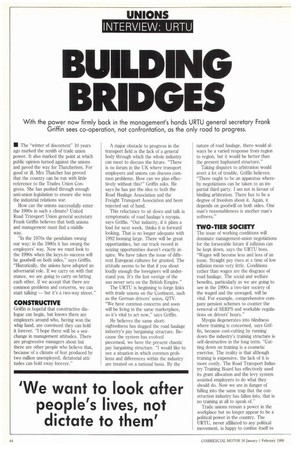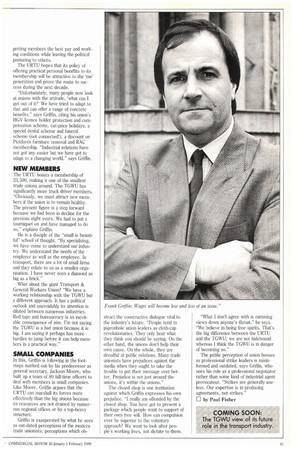BUILDING BRIDGES
Page 46

Page 47

If you've noticed an error in this article please click here to report it so we can fix it.
• The "winter of discontent" 10 years ago marked the zenith of trade union power. It also marked the point at which public opinion turned against the unions and paved the way for Thatcherism. For good or ill, Mrs Thatcher has proved that the country can be run with little reference to the Trades Union Congress. She has pushed through enough anti-union legislation to ensure she wins the industrial relations war.
How can the unions successfully enter the 1990s in such a climate? United Road Transport Union general secretary Frank Griffin believes that both unions and management must find a middle way.
"In the 1970s the pendulum swung our way; in the 1980s it has swung the employers' way. Now we must look to the 1990s when the keys .to success will be goodwill on both sides," says Griffin. "Historically, the unions have adopted an adversarial role. If we carry on with that stance, we are going to carry on hitting each other. If we accept that there are common problems and concerns, we can start talking — but it's a two-way street."
CONSTRUCTIVE
Griffin is hopeful that constructive dialogue can begin, but knows there are employers around who, having won the whip hand, are convinced they can hold it forever. "I hope there will be a seachange in management attitudes. There are progressive managers about but there are other people who believe that, because of a climate of fear produced by two million unemployed, dictatorial attitudes can hold sway forever." A major obstacle to progress in the transport field is the lack of a general body through which the whole industry can meet to discuss the future. "There is no forum in the UK where transport employers and unions can discuss common problems. How can we plan effectively without this?" Griffin asks. He says he has put the idea to both the Road Haulage Association and the Freight Transport Association and been rejected out of hand.
This reluctance to sit down and talk is symptomatic of road haulage's myopia, says Griffin. "Our industry, if it plans a load for next week, thinks it is forward looking. That is no longer adequate with 1992 looming large. There will be great opportunities, but our track record in seizing opportunities doesn't exactly inspire. We have taken the issue of different European cultures for granted. The attitude seems to be that if you shout loudly enough the foreigners will understand you. It's the last vestige of the sun never sets on the British Empire."
The URTU is beginning to forge links with trade unions on the Continent, such as the German drivers' union, QTV. "We have common concerns and soon will be living in the same marketplace, so it's vital to act now," says Griffin.
He believes the same shortsightedness has dogged the road haulage industry's pay bargaining structure. Because the system has evolved piecemeal, we have the present chaotic pay bargaining structure. "I would like to see a situation in which common problems and differences within the industry are treated on a national basis. By the nature of road haulage, there would always be a varied response from region to region, but it would be better than the present haphazard structure."
Taking disputes to arbitration would avert a lot of trouble, Griffin believes. "There ought to be an apparatus whereby negotiations can be taken to an impartial third party. I am not in favour of binding arbitration. There has to be a degree of freedom about it. Again, it depends on goodwill on both sides. One man's reasonableness is another man's softness."
TWO-TIER SOCIETY
The issue of working conditions will dominate management-union negotiations for the forseeable future if inflation can be kept down, says the URTU boss. "Wages will become less and less of an issue. Straight pay rises at a time of low inflation mean very little. Conditions rather than wages are the disgrace of road haulage. The social and welfare benefits, particularly as we are going to see in the 1990s a two-tier society of the waged and the unwaged, will be vital. For example, comprehensive company pension schemes to counter the removal of SERI'S and workable regulations on drivers' hours."
Myopia degenerates into blindness where training is concerned, says Griffin, because cost-cutting by running down the industry's training structure is self-destructive in the long term. "Cutting down on training is a cosmetic exercise. The reality is that although training is expensive, the lack of it is more costly. The Road Transport Industry Training Board has effectively used its grant allocation and the levy system assisted employers to do what they should do. Now we are in danger of falling into the same trap that the construction industry has fallen into, that is no training at all to speak of."
Trade unions remain a power in the workplace but no longer appear to be a political power in the country. The URTU, never affiliated to any political movement, is happy to confine itself to getting members the best pay and working conditions while leaving the political posturing to others.
The URTU hopes that its policy of offering practical personal bendfits to its membership will be attractive to the 'me' generation and prove the route to success during the next decade.
"Unfortunately, many people now look at unions with the attitude, 'what can I get out of it?' We have tried to adapt to that and can offer a range of concrete benefits," says Griffin, citing his union's HGV licence holder protection and compensation scheme, cut-price holidays, a special dental scheme and funeral scheme (not connected!), a discount on Pickfords furniture removal and RAC membership. "Industrial relations have not got any easier but we have got to adapt to a changing world," says Griffin.
NEW MEMBERS
The URTU boasts a membership of 23,500, making it one of the smallest trade unions around. The TGWU has significantly more truck driver members. "Obviously, we must attract new members if the union is to remain healthy. The present figure is a step forward because we had been in decline for the previous eight years. We had to put a tourniquet on and have managed to do so," explains Griffin.
He is a disciple of the "small is beautiful" school of thought. "By specializing, we have come to understand our industry. We understand the needs of the employer as well as the employee. In transport, there are a lot of small firms and they relate to us as a smaller organisation. I have never seen a diamond as big as a brick."
What about the giant Transport & General Workers Union? "We have a working relationship with the TGWU but a different approach. It has a political outlook and unavoidably its attention is diluted between numerous industries. Red tape and bureaucracy is an inevitable consequence of size. I'm not saying the TGWU is a bad union because it is big. I am saying it perhaps has more hurdles to jump before it can help members in a practical way."
SMALL COMPANIES
In this, Griffin is following in the footsteps marked out by his predecessor as general secretary, Jackson Moore, who built up a team of 80 full-time officers to deal with members in small companies. Like Moore, Griffin argues that the URTU can marshall its forces more effectively than the big unions because its resources are not drained by numerous regional offices or by a top-heavy structure.
Griffin is exasperated by what he sees as out-dated perceptions of the modern trade unionists; perceptions which ob struct the constructive dialogue vital to the industry's future. "People tend to pigeonhole union leaders as cloth-cap revolutionaries. They only hear what they think you should be saying. On the other hand, the unions don't help their own cause. On the whole, they are dreadful at public relations. Many trade unionists have prejudices against the media when they ought to take the trouble to put their message over better. Prejudice is not just around the unions, it's within the unions."
The closed shop is one institution against which Griffin expresses his own prejudice. "I really am offended by the closed shop. You have got to present a package which people want to support of their own free will. How can compulsion ever be superior to the voluntary approach? We want to look after people's working lives, not dictate to them. "What I don't agree with is ramming views down anyone's throat," he says. "We believe in being free spirits. That's the big difference between the URTU and the TGWU; we are not hidebound whereas I think the TGWU is in danger of becoming so."
The public perception of union bosses as professional strike leaders is misinformed and outdated, says Griffin, who sees his role as a professional negotiator rather than some kind of industrial agent provocateur. "Strikes are generally useless. Our expertise is in producing agreements, not strikes."
0 by Paul Fisher








































































































































